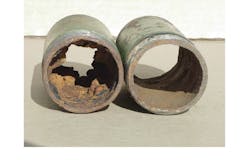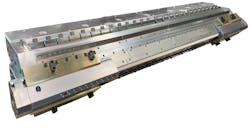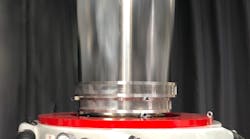By Bruce Adams
Operators of water-cooled extruders for years have grappled with corrosion and clogs. The water evaporates during the cooling process, leaving a host of unwanted solids — corrosion, mineral scale and iron — in the cooling lines. These clogs inhibit cooling and often damage cooler jackets and related equipment so badly that they need to be replaced.
Companies have used treated water, deionized water and glycol to try to prevent these blockages. Some methods have been more effective than others, but few companies have solved the problem so that it doesn’t cause costly shutdowns for cooling system maintenance.
Sonoco Clear Pack in Franklin Park, Ill., has had many years of success cleaning and maintaining its extrusion lines using two products from Chemagineering Corp., a provider of specialty water management products to the plastics industry and other industries.
Clear Pack began using an industrial cleaner called CH-7:54 made by Chemagineering in its extruders more than 30 years ago. It’s an organic, non-hazardous agent for removing scale and iron oxide. It’s designed for severely fouled systems.
“Clear Pack started using the cleaner in 1986, before they were acquired by Sonoco Products Co.,” said Peter Greenlimb, founder and president of Chemagineering. “I was unaware of the corrosion problems that they were experiencing in their extrusion lines until around 2000. It was then that the Extrusion Performance Fluid coolant technology was developed. They have been using the coolant in their extruders since 2000.”
Chemagineering offers a two-step process to clean fouled extruders. Step 1 is cleaning the lines with its CH-7:54 Industrial Cleaner. Step 2 is keeping the lines clean with its Extrusion Performance Fluid (EPF), an organic, water-based coolant designed to prevent barrel cooling water system corrosion and mineral scale fouling. Cleaning only needs to be done once if the lines are continually maintained with the EPF.
“It’s really not necessary to periodically clean these systems,” said Greenlimb, who has a doctorate in organic chemistry and has worked in the industrial water treatment industry since 1973. “If you start with a fouled system, you clean it once and, if you consistently use the EPF coolant, you won’t get into trouble with corrosion or scale. The coolant contains inhibitors to prevent corrosion and fouling in the system.”
The cleaning process normally takes approximately four hours.
“You need an hour or two to cool down the extruder and a couple of hours max to clean it,” Greenlimb said. “You dump and drain the old coolant out of the system. Fill it with fresh water and put the cleaner in and recirculate it for an hour or two and dump it. Then you should flush the system with water before you add the EPF coolant.”
The water in the coolant will evaporate during cooling, so processors need to add more coolant to make sure there is enough in the system to keep the lines cool and clean, he said.
“With high-impact polystyrene production, we’re talking about zone temperatures of 400 to 425 degrees Fahrenheit and any water that is in that system is evaporated completely,” Greenlimb said. “We rely on the efficiency of the heat exchanger to cool the returns from the zones prior to being brought back into the reservoir tank and recirculating back into the zone heater coolers.”
Most extrusion systems have reservoir tanks ranging from 30 to 50 gallons that need to be maintained at a certain level with coolant.
“Typically, the system will use two to four drums of coolant a year, which is roughly 2 to 4 gallons a week of coolant per extruder,” Greenlimb said.
Brian Varley, plant engineering manager at Sonoco Clear Pack, is an extrusion industry veteran. He said he was pleased when he joined the company 12 years ago and learned it was not troubled by fouled cooling lines on extruders.
“Every other extrusion plant I’ve ever worked in, we were changing heating jackets, sometimes as often as once a week, because they would get corroded and crack, and it was just brutal,” Varley said. “One plant I worked at was running well water through the lines and that was the worst. But I’ve worked other places where they were running decent city water, or, as we call it here, Lake Michigan water because a lot of the suburbs get fed from Lake Michigan. That’s better than well water, but is still fairly hard. That water also clogged up the works pretty quick. I wish I had this product in some of the other places I worked. I think I would have had a lot fewer headaches.”
Clogged cooling lines on extruders cause the need for costly maintenance shutdowns and often expensive repairs, if parts can’t be properly cleaned, he said.
“The cooling jackets alone, depending on their size, could cost from $2,500 to $4,500 each,” Varley said. “And then you’ve got the downtime. At our plant, if we’re down, it costs us about $1,000 an hour. If you lose an eight-hour shift to replace the jacket, plus the cost of the jacket, plus the cost of tubing and other related parts that need to be replaced, it ends up getting up into the five digits, $10,000 to $15,000. If we have to buy material on the outside to make up for the lost production, that’s an additional cost on top of that.”
Sonoco Clear Pack operates two single-screw extruders 24/7/355, shutting down for 10 scheduled holidays per year. The plant extrudes sheet made from high-impact polystyrene. A variation of the EPF coolant, ChillCARE Thermoformer Coolant with enhanced protection for aluminum molds, is used in the plant’s thermoformers.
“We have a thermoforming operation. We take our extruded sheet, and we thermoform it into food packaging,” Varley said. “The thermoformers run the material as it’s being molded. It’s only cooled to about 95 to 100 degrees Fahrenheit before it’s trimmed.”
Due to the different cooling requirements of the extruders and thermoformers, the plant needs to use two different coolants. Chemagineering has simplified that for the plant by providing the coolants in two colors, blue and pink.
Chemagineering sells the coolants in 55-gallon drums, 275-gallon totes and 330-gallon totes.
Because the coolant and the industrial cleaner are both organic, non-hazardous, water-based products, they can be disposed of through sanitary sewer systems, Greenlimb said.
“We even had an application of the cleaner used by a remote plant that was on a septic field,” Greenlimb said. “We had to go to the local municipality and ask them if this cleaner after it’s been used could be discharged in the septic field, and it was approved.”
He cautioned that there’s a slight risk the effluent might have very high concentrations of alloyed steel metals after an extruder has been cleaned. In that case, it would need to be disposed of as hazardous waste.
Greenlimb said that about half of his company’s business is in the plastics industry. In addition to offering coolants for extruders and thermoformers, he sells a third variation of it to injection molders.
“I didn’t do any calculations, but I would say one-third of our plastics business is barrel cooling for extrusion, one-third is in thermoforming applications, and one-third is in roll stands and injection molding machines,” he said.
Bruce Adams, senior staff reporter
For more information:
Chemagineering Corp., Rolling Meadows, Ill., 847-382-7548, www.chemagineering.com






